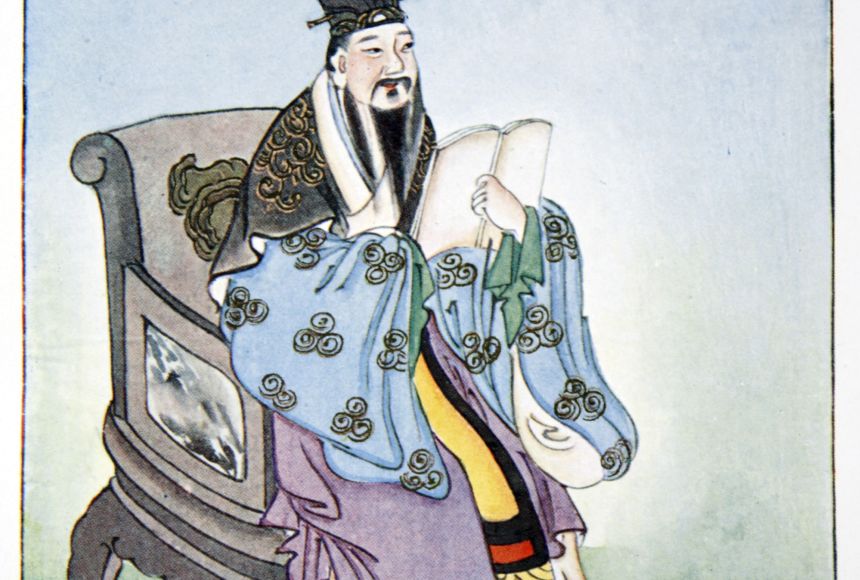Confucianism is a philosophy and belief system from ancient China that laid the foundation for much of Chinese culture. Confucius was a philosopher and teacher who lived from 551 to 479 B.C.E. His thoughts on ethics, good behavior and moral character were written down by his disciples in several books, the most important being the Lunyu. Confucianism promotes ancestor worship and human-centered virtues for living a peaceful life. Some examples of ancestor worship include maintaining a shrine in one’s home for relatives that have passed on and making offerings of food and drink, flowers or incense at gravesites. The golden rule of Confucianism is “do not do unto others what you would not want others to do unto you.”
Confucianism is a term that Westerners coined; there is no equivalent in any Chinese dialect. Over time, Confucian teachings became closely tied to the rituals and beliefs associated with Buddhism and Taoism. Together, the tenets of these three religious philosophies became known as The Three Teachings. All three are deeply embedded in Chinese culture.
Religion vs. Philosophy
Scholars disagree about whether Confucianism should be considered a religion or a philosophy. It began as a revival of an earlier religious tradition and has some characteristics of the Western framework of religion. There are also Confucian temples where important community and civic rituals happen. Confucianism does not, however, fit neatly into the Western concept of religion. There are no Confucian gods, and Confucianism focuses neither on the creation of the Earth or human life nor the afterlife. Although many people emphasize that Confucianism is both a religion and a philosophy, it is better understood as an ethical guide to life in the here and now.
Confucian Teachings
The main idea of Confucianism is the importance of having a good moral character, which can affect the world around a person through the idea of cosmic harmony. This moral character is achieved through the virtue of ren, or “humanity,” which leads to more virtuous behaviors, such as respect, altruism and humility. If an emperor has moral perfection, his rule will be peaceful and benevolent. Natural disasters and conflict, on the other hand, are a natural consequence of straying from ancient teachings. Confucius believed in the importance of education in order to create this virtuous character. He thought that people are essentially good yet may have strayed from the appropriate forms of conduct. Rituals in Confucianism were designed to bring about this respectful attitude and create a sense of community within a group.
The idea of “filial piety,” or devotion to family, is key to Confucius thought. This devotion can take the form of ancestor worship, submission to parental authority or the use of family metaphors, such as “son of heaven,” to describe the emperor and his government. The family is the most important group for Confucian ethics, and devotion to family can only strengthen the society surrounding it.
Confucianism Past and Present
While Confucius gave his name to Confucianism, he is understood as a spiritual leader as opposed to the founder of a new religion or philosophy. This is in part due to the fact that Confucius was not the first person to discuss many of the concepts that became central to Confucianism. Indeed, Confucius was concerned with the preservation of traditional Chinese knowledge from earlier thinkers, such as such as Zhougong, a leader of China in the 11th century. Confucius viewed Zhougong as a hero because he willingly and peacefully transferred power to his nephew, maintaining harmony in Chinese society. Some practices associated with Confucianism, such as ancestor worship, also appear to predate Confucius. This suggests that Confucianism incorporated existing customs.
After Confucius’s death, several of his disciples compiled his wisdom and carried on his work. The most famous of these disciples were Mencius and Xunzi, both of whom further developed Confucian thought and ideals.
Confucianism includes strict rules about class in Chinese society, which contributed to the stratification of ancient Chinese society. China was divided into four social classes: the noble or scholar elite class, the landowners and farmers, craftsmen, and merchants (who were lowest on the scale because Confucius argued against luxury). People were taught to stay in their social classes to create social harmony, which discouraged anyone from rising in status. Women were considered a different and lower social class than men. According to Confucian rules, women had to obey their male family members, including their sons. Practices like feet binding became more popular, and women’s social power decreased as Confucian ideas had a resurgence during the Song period (960–1279 C.E.).
Confucianism remains one of the most influential philosophies in China. During the Han Dynasty, emperor Wu Di (reigned 141–87 B.C.E.) made Confucianism the official state ideology. During this time, schools were established to teach Confucian ethics. Confucianism existed alongside Buddhism and Taoism for several centuries as one of the most important Chinese religions. In the Song Dynasty (960–1279 C.E.) the influence from Buddhism and Taoism brought about “Neo-Confucianism,” which combined ideas from all three religions. However, in the Qing dynasty (1644–1912 C.E.), many scholars looked for a return to the older ideas of Confucianism, prompting a Confucian revival.
Confucianism was denounced under Chairman Mao Zedong, but the current Chinese government recognizes that Confucianism is aligned with its socialist goals. For example, Confucian ideas regarding the hierarchy of society and concept of social responsibility fit with socialist communal values and strict government and societal structure.
